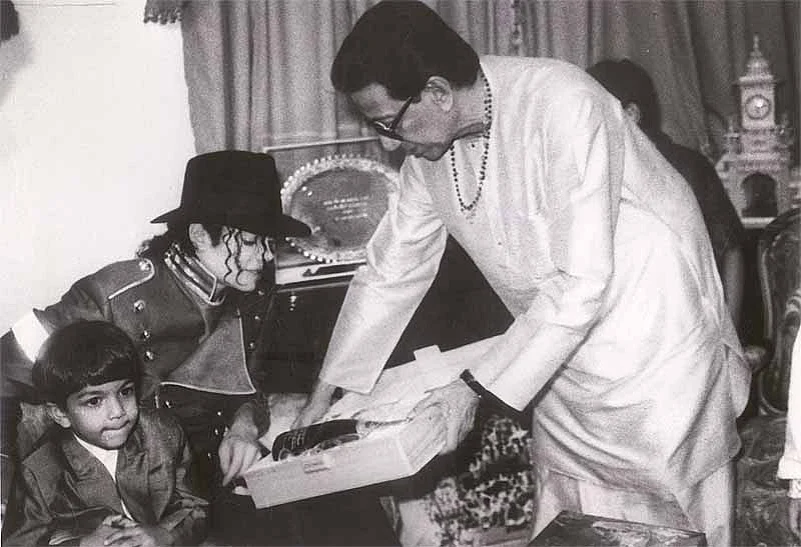The 65 year long narrative of my life would be incomplete without Bal Thackeray. He figures in a major way in my journey.
A person can't be reduced to just one memory. There are many dimensions and layers that reveal over a period of time. Bal Thackeray, to me, is an aggregate of many such memories.
I grew up in Shivaji Park, was extremely comfortable with the Maharashtrian culture around me. My earliest memory of Thackeray is of the impassioned speeches he used to give in the maidan. We often saw him zoom past in the car while we played cricket on the streets. The word "Saheb" had not been added to his name till then.
Then a new dimension got added to him when Shiv Sena terror was unleashed on the Gujaratis and we were forced to shift to Union Park. A menacing dimension was added to him which got heightened when the Tamilians were targeted. Now I found my friend Babu Subramaniam at the receiving end.
Then one day he landed at my sister's wedding which was in a restaurant next to the Shiv Sena Bhavan. This was in the 70s, when the "Saheb" tag had been added to his name. I remember him in a Nehru jacket — and his overwhelming warmth despite the daunting stature.
The next memory has to do with my film Saaransh. The portrayal of the villain Gajanan Chitre by Nilu Phule was considered by many to have been dangerously close to Thackeray. I did reference him. The attributes, the body type, the glasses were borrowed. This was the time of his fierce run in with the Communist Party. The producer Raj Kumar Barjatya thought it might upset him, he might feel that we have demonised him. That some mischief makers may deliberately harm the film. So he was invited for a screening at the Prabha Devi office. He came with security guards, clad in white. After having watched the film, surprisingly, he was all praise for its theme, the Marathi ethos and the central character of the old man and his value system. He clearly got what the film was about—old age, loss, death. Nowhere could I see him as an antagonist then.
This was followed by the unfortunate run-in over Mohsin Khan. Mohsin had married Reena Roy, and starred in the film Saathi, which was pulled off in Dadar after a successful run of 15 weeks. He had left Pakistan to pursue a career in Bollywood and this sounded the death knell for it. I went with him to plead his case with Thackeray. We went to the mayor's bungalow in Shivaji Park. That was the time when Shiv Sena had wrested the municipal power in the 80s. It was a heartbreaking scene where his coterie attempted to browbeat and belittle Mohsin. I still retain that painful memory. A man from the neighbouring country, who was apolitical, whose mind had not been hijacked by the communal forces had been given a raw deal here. It left a bitter taste in my mind and heart. Later Shiv Sena stoned his car, the windows were smashed. He was petrified. We went to meet Thackeray again. He was away in Thane, we waited for him till very late but were not given an audience. That's when I saw the doublespeak of a politician emerge. Mohsin had to abort his career and fly back to Pakistan with his daughter.
Some years later came the seemingly organised carnage, the nightmare in the wake of Babri Masjid demolition. We rallied behind Sunil Dutt for the plurality of Mumbai. He was fiercely opposed to him. He emerged as the other, came to symbolise the ideology of intolerance and politics of hatred. He played the full blown, categorical Hindutva card. Those were dark, terrible times.
But a sweet memory related to the film Tamanna followed. It was a film on female infanticide where a Muslim eunuch brings up a Hindu girl. This was in 19 95, when they were in power, the Hindutva roots had bloomed and we felt they might find the film provocative. That he might think that we had demonised the Hindu father. We wanted a tax exemption for which we had to route the film though them. He saw the film and wanted to meet the real eunuch on whose life the film had been made. He wanted to give him some financial support. I was pleasantly surprised.
At the time of Zakhm, the then censor board chief Asha Parekh fearing the wrath wanted to show the film to him. She wanted to play safe. That was when Mani Ratnam had also shown Bombay to him for approval. But in the case of Zakhm the problems didn't emerge at the local party level. It was the home ministry under Lal Krishna Advani that had issues, and was proving to be the stumbling block and forced us to change the saffron party flags shown in the film to grey. It had no problems or interference in Maharashtra. It had a free run.
I realise an individual can be quite distinct from the image created and projected in his political speeches, public postures and in the media. And that holds true of all political personalities the world over. A dichotomy between the private life and public life inevitably emerges. To me he has been all about bitter residues of some memories chequered with some utterly humane utterances.
As told to Namrata Joshi. This piece only appears on the web


























